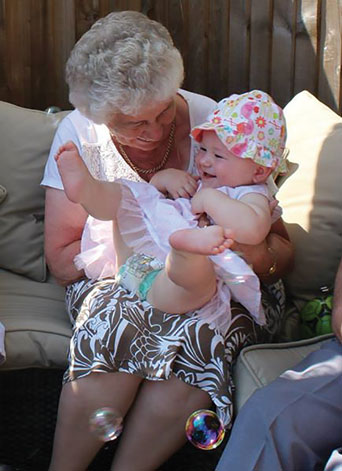1 Remembering childhood
Penn and McQuail (1997) found that students drew heavily on childhood memories to inform their practice. This is a reason to reflect back upon your own childhood experiences with your parent(s), carers or extended families. Reflecting back on your childhood experiences with your parent(s), carers or extended families, you may feel that they influenced how you understand children, childhood and possibly parenthood or practice. Can you see traits, dispositions, temperaments and attitudes in yourself that you think might be passed on from previous generations? Or perhaps, as a parent, you can identify aspects of your parenting style with how you were brought up.
Look at this photograph of Evie and her Grandmother enjoying a song together. Evie’s favourite songs are ‘Pat-a-cake,’ ‘Round and round the garden like a teddy bear’, ‘This little piggy’, ‘Rock-a-bye baby’ and ‘One, two, buckle my shoe’; songs which have been handed down through the generations in her family. They formed part of her mother’s childhood experience and now they have significance as part of this family’s culture.
Although ‘“culture” describes a set of related beliefs and practices of a particular community’, it is important to recognise that ‘not everyone in the community will understand or practise them in the same way’ (Penn, 2009, p. 49). Singing and clapping games between adults and children are common across many communities, but they will be practised differently from group to group and also within each group. Evie’s experience of traditional songs and rhymes will be shaped by the way she plays these games with particular members of her family. So ‘culture’ refers to social influences on children’s learning on many different levels.
Activity 1
Take some time to think about the play, songs or activities that you enjoy sharing with young children that you know. These may your own children, children within your extended family, children of friends or children you know as a practitioner. Make a list of these activities in the space provided below. Try to be as specific as you can for example name your favourite songs or rhymes or give some detail about the activity.
When you have finished making the list look at each of the items and ask yourself if these remind you of any memories of your own childhood. Can you see any connections with your own family life or the community in which you grew up?
Comment
You may have found some connections with your own play memories much clearer than others, for example the link that Evie’s mother was able to make between the songs she sang to her daughter and her own childhood experiences. Others will be less obvious or may take you more time to reflect on. Try to keep these in mind and return to them as you work your way through the course. The family and the culture surrounding it are in many respects the foundations of children’s learning and so the connections are more deep-seated than we at first realise.
Key points
- Childhood memories are valuable in understanding the influence of family on the experience of childhood.
- Children’s experiences of play and interaction are influenced by their family culture and wider culture.

